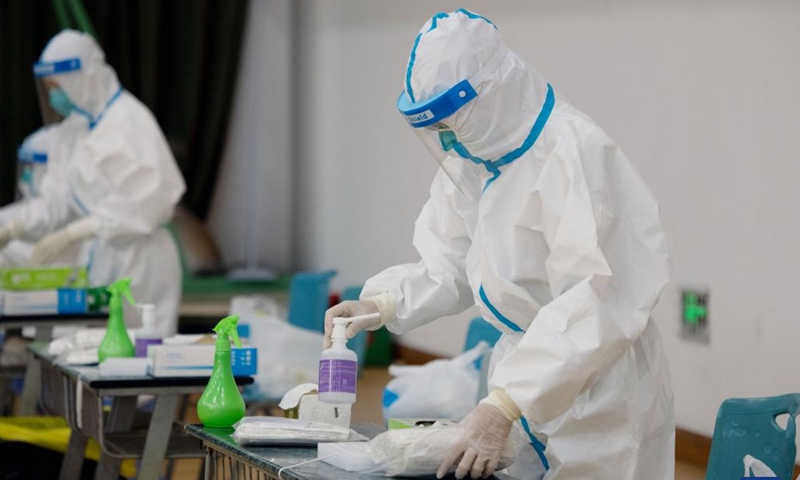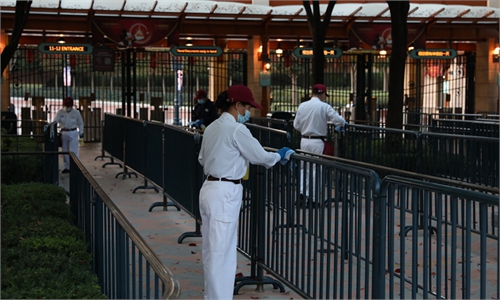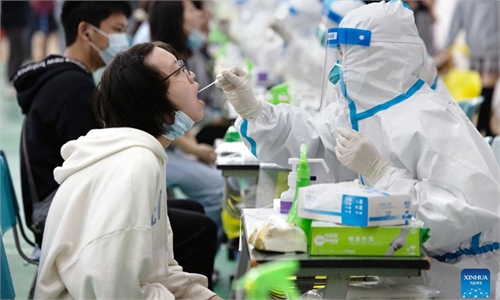Sustaining normal life as important as implementing dynamic zero-case policy: Zhang Wenhong

Medical workers prepare to carry out nucleic acid tests at a nucleic acid testing site in Qingpu district of East China's Shanghai, March 14, 2022. Photo: Xinhua
Sustaining a normal life should be placed in the same important position as implementing dynamic zero-case policy, which is the future path for the long-term fight against COVID-19, and the mindset of "fighting the virus regardless of costs" should be abandoned, Shanghai-based renowned infectious disease expert Zhang Wenhong said late Wednesday.
Zhang's remarks, released in his Sina Weibo post, came at a time when Shanghai is fighting its toughest battle against the virus since the epidemic started.
Shanghai reported four confirmed cases and 979 asymptomatic cases, according to the local health commission on Thursday.
In the post titled "Coronavirus not scary but difficult to fight," Zhang admitted that facing an exponential increase of asymptomatic cases, Shanghai is struggling to deal with the epidemic and the medical resources have been quickly strained. "I cannot pretend that there are no difficulties, but we are constantly learning and improving as the epidemic changes, striving to make patients feel better and recover faster."
It is difficult in practice to place the city on a standstill to stamp out the virus while trying to sustain the economy. Despite the raging outbreak, Shanghai won't adopt a one-size-fits-all approach, he said.
The recent good news is that Shanghai's epidemic is showing good signs and the condition for embracing a turning point of the epidemic has been formed. New infections from non-restricted regions are declining, only accounting for 10 percent of the tally infections, Zhang said.
He noted that China's anti-epidemic work is entering a new phase, and those measures of halting entire regions' economies and lives and instituting rounds of city-wide tests will be gradually updated, which is a message delivered from the new revised guideline on nucleic acid testing. But if we do not act quickly enough, we have no chance to beat Omicron, Zhang said.
On the day when the new guideline was released, Shanghai put its priority on "strictly screening out cases and increasing testing capability" and stressed close coordination and relocation of resources, and that's when Shanghai generated the capability to win against Omicron, Zhang explained.
The new guideline on nucleic acid testing released on Tuesday highlights regional nucleic acid testing instead of previous mass testing to more scientifically locate the areas for testing, and sets a strict time limit for the designated area of a city to complete testing, which is to be finished within 24 hours.
Zhang also acknowledged that problems exist in Shanghai's fight against Omicron. Some people stated "lives of people living in epidemic-restricted areas is not well guaranteed, the restriction period is too long, and frequent restrictions of hospitals cause inconvenience for other patients" - but Shanghai won't evade those problems, he said.
"The combat against coronavirus is a long-term one, it requires us not only to stamp out the epidemic, but also guarantee people's lives and normal access to hospitals, and the survival of businesses. All these will become the focus of a later phase of Shanghai's fight against coronavirus."
Shanghai began a new round of nucleic acid testing for key regions from Wednesday to Thursday within a much narrower scope under the targeted preventive measures for COVID-19, dismissing rumors that they'll increase the number of people put under closed management and lockdown.
The good news revealed by a study of the University of Hong Kong that three shots of inactivated vaccinees offered a protection rate of above 95 percent against death or severe illness underscores the confidence for China to beat coronavirus, Zhang said.


